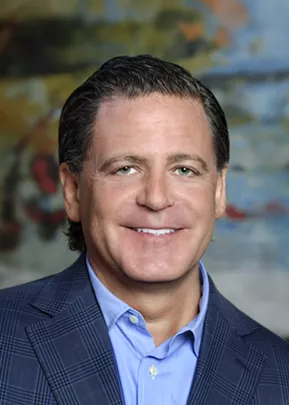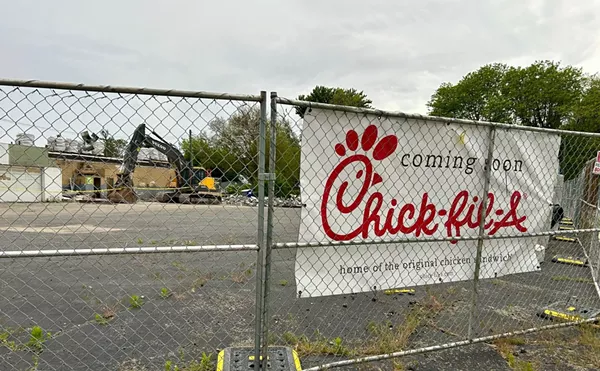
Audio By Carbonatix
[
{
"name": "GPT - Leaderboard - Inline - Content",
"component": "35519556",
"insertPoint": "5th",
"startingPoint": "3",
"requiredCountToDisplay": "3",
"maxInsertions": 100,
"adList": [
{
"adPreset": "LeaderboardInline"
}
]
}
]

Courtesy of Quicken Loans
When the U.S. Supreme Court convenes a hearing next week on a lawsuit related to the mortgage industry, it centers on an issue so mind-numbingly dry, it makes News Hits sleepy just saying it aloud: Whether or not a federal agency must gather public comment before it issues an interpretation of a law. It’s a procedural issue.
In this case, the agency in question is the Department of Labor (DOL). In 2010, the DOL issued an interpretation of a federal labor law that says mortgage bankers must be paid overtime. As expected, this decision caused the mortgage industry to collectively reel in pain, as it has been the contention of lenders for years that mortgage bankers can work for a low base wage with the “incentive” of commission.
So why is the plight of the mortgage banker of interest to us? The issue actually goes back to a lawsuit filed 10 years ago in U.S. District Court in Detroit by over 400 former employees of Quicken Loans against the company. At the time, the employees alleged they should receive overtime compensation because they were salespeople; Quicken contended otherwise.
The Quicken employees, who are expected to work at least 55 hours per week, earn a commission on top of their $25,000-$30,000 base salary. The commission wages, Gilbert previously told this rag, net those mortgage officers upwards of $60,000-$70,000 more.
But the lawsuit — Henry v. Quicken Loans — filed in 2004 by Minneapolis-based law firm Nichols Kaster on behalf of the Quicken employees, argued they should’ve been paid time-and-a-half for all overtime hours. This reportedly could put Quicken on the hook for as much as $30 million in past-due wages if it lost the case.
For years, however, Quicken has argued its loan officers fell under an exemption for administrative employees in the federal Fair Labor Standards Act. This allowed them to pay a fixed salary, plus commissions.
Quicken also says the employees earned more from their salary and commission than they would if they earned a salary plus overtime.
Fast-forward to 2006, when the DOL threw a wrench in the Henry proceedings. It issued an interpretation of the law that sided with Quicken's opinion: Mortgage bankers were exempt under the law and could receive a salary plus commission wages.
After the case dragged on for five more years, a jury returned a unanimous verdict in favor of Quicken. But that didn’t settle the issue.
That’s because, in 2010, under the administration of President Barack Obama and his appointees, the DOL did an about-face, and issued another interpretation on the matter, saying mortgage bankers were not exempt from the law and must be paid overtime. The conflicting opinions, as expected, caused some problems in the industry.
That brings us to the current case in Washington, D.C., before the Supremes between the DOL and the Mortgage Bankers Association, the industry’s lobby arm.
While the high court is not deciding whether mortgage bankers should receive overtime, the case will ultimately have a major impact on the mortgage industry: It could be a decision that costs Quicken and Dan Gilbert millions.
But employees in the Henry suit contend that more went on besides a boring procedural issue. Through numerous court filings that span multiple jurisdictions, they suggest that Quicken sought to influence the process at the federal level, while engrossed in the Henry case, and used its connections to garner a favorable ruling from the DOL. The employees brought up the issue again to the Supreme Court.
Way back in 2002, a judge handed down a decision, finding that mortgage bankers should be paid overtime. Soon after, the Mortgage Bankers Association began lobbying the DOL to reverse its “employee-friendly loan officer interpretations,” the Quicken employees wrote in a brief. A lawyer for Quicken raised concerns about the decision that found mortgage bankers needed to be paid overtme.
In an email obtained by plaintiffs' attorneys in the Henry case, Quicken’s corporate counsel, Angelo Vitale, told Quicken executives, “Suffice it to say, unless the [federal] overtime exemptions are explicitly broadened to cover mortgage loan originators (especially as applied to a web/call center environment such as ours), this decision could have a serious financial impact on our business.”
So in 2003, the Mortgage Bankers Association hired Robert Davis, a former Solicitor of the DOL, as the group’s chief lobbyist. His goal: to garner an opinion from the Department of Labor that would clarify mortgage bankers were exempt under federal law, and could receive a salary plus commission.
There was a problem with this arrangement, Quicken employees contend in a brief: “During the same time period, Mr. Davis served as chief litigation counsel to Quicken Loans Inc., which was engaged in overtime litigation against hundreds of its former loan officer employees.” Davis signed on as co-counsel for Quicken in the Henry case in late January of 2005.
Then, from July 2005 until September 2006, attorneys documented Davis’ multiple discussions with “some of the personal connections he had developed at the DOL during his tenure at the agency and lobbied for an opinion letter reversing the agency’s prior loan officer interpretations,” the brief continues.
Davis wasn’t just seeking a favorable opinion from the DOL (an opinion that would benefit Quicken in its ongoing litigation), the brief argues.
“Instead, correspondence … [shows] that Mr. Davis and DOL attorneys worked hand-in-hand on the interpretation, behind closed doors, extensively negotiating both the factual assumptions and legal analysis on which the DOL’s opinion would be based,” the brief says.
In other words, the same lawyer arguing on behalf of Quicken Loans helped write an interpretation of a law that would garner a favorable opinion for the lender. Davis was wearing multiple hats on a related issue, the attorneys argued, and the Labor Department earnestly listened to him. In political jargon, this is known as “regulatory capture.”
But Davis noted his firm’s legal fees related to the work to obtain the Labor Department’s 2006 interpretation were paid “exclusively” by the Mortgage Bankers Association — not Quicken, which, as a member of the association, pays an annual fee to receive its services.
Still, his relationship with the Mortgage Bankers Association and Quicken raised a number of additional concerns, the employees' attorneys claimed, because Davis maintained in a letter to the DOL requesting the 2006 interpretation that the opinion was “not sought by a party to pending private litigation concerning the issue addressed herein.”
In other words, Davis maintained his request to the DOL for a favorable opinion on the overtime issue had nothing to do with a related lawsuit — while he continued to represent Quicken.
Then, on Sept. 8, 2006, following numerous meetings between Davis and attorneys from the DOL, the interpretation was issued “consistent” with conclusions reached by Davis in his initial request for an opinion on the overtime matter, the employees’ attorneys wrote.
“In other words, the letter assumed the very conclusion Davis and his connections at the DOL sought to achieve,” the attorneys wrote.
How did this happen?
Well, up until this point, judges at the lower courts thought the employees' argument was poppycock. For example, in 2010, United States Magistrate Judge Steven Pepe basically acknowledged that Davis represented the entire mortgage bankers industry in its pursuit to score a favorable opinion from the Labor Department on the overtime pay issue. And Pepe also acknowledged Quicken had a clear connection to the MBA with Davis as an attorney. But it was all legally inbounds.
In a filing with the Supreme Court, Quicken says the concept that the company colluded with the Mortgage Bankers Association to score a favorable opinion “has been rejected repeatedly … and the DOL confirmed there was nothing improper or inappropriate in the DOL’s issuance of the 2006 Opinion Letter.”
Attorneys representing the employees did not return requests for comment at press time. In an emailed statement to the Hits, Quicken spokesperson Aaron Emerson declined to comment on the regulatory capture allegation, and said the case before the Supremes does not “directly” involve the company. However, he said, “While we, like the rest of the industry, will monitor the outcome of the hearings, our position on overtime is clear and has been validated by our success in both a jury trial (with a 9-0 decision in our favor) as well as on appeals.”
The U.S. Supreme Court will hear arguments from the Mortgage Bankers Association and the DOL on Monday, Dec. 1. Whether the justices decide to address this narrative won’t be known for months until an opinion is issued, likely sometime in the spring.






